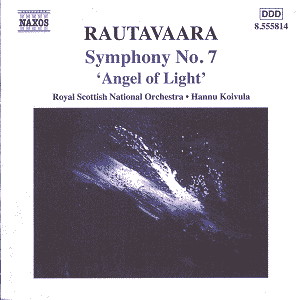Rautavaara is one of the most imaginative and distinctive
of living composers. His range is exceptionally wide: the distinguished
Finnish musicologist Kimmo Korhonen has described him as 'at once romantic
and intellectual, mystical and constructivist'. His creative life has
developed through a great many stages stylistically, allowing to include
different elements and features within individual works. In this sense
he is a true 'post-modernist' not restricted to a narrowly-defined expressive
or technical approach. As he has matured so this process has gained
in significance; certainly since the 1970s Rautavaara has consciously
been creating a synthesis of various stylistic influences.
Rautavaara's has composed prolifically over a period
of more than forty years, and his versatile output contains several
operas, seven symphonies and other orchestral works, concertos, chamber
music, piano music and vocal music. He has been a major figure in Finnish
musical life since the 1950s, when he received the personal support
of Sibelius. With the wider performance of his music, Rautavaara has
been steadily gaining in international recognition, particularly during
the past decade.
Both pieces featured here are substantial compositions,
playing for 35 and 20 minutes respectively. The more recent is the Seventh
Symphony. Entitled 'Angel of Light', it was composed in 1994, taking
a stage further the series of 'Angel' compositions Rautavaara had begun
back before the 1980s (of which Angels and Visitations of 1978
is another). Despite its recent date of composition, this version is
actually the third recording of the Seventh Symphony to have been issued,
the other two conducted by Osmo Vänskä and Leif Segerstam.
However, this is the first to come from an orchestra outside Finland
and the first to come at bargain price.
The Naxos version stands up well to this strong competition,
although it is by no means a first choice. The conducting of Hannu Koivula
captures the mysticism of the musical language, while he also has a
real grip on the structure. As we would expect, the Scottish orchestra
acquits itself with distinction and the recorded sound is very good,
enabling their playing to shine.
Angels and Visitations, the first in Rautavaara's
'Angel' series of compositions, was inspired by a poem by Rilke and
is concerned with images derived from dreams. Therefore the music has
a mystical quality, although there is no direct programme. The expressive
range is wide, with some impressive music for brass and percussion as
well as passages atmospherically relying upon the strings. With splendid
playing and good recorded sound, this like the Symphony can receive
a confident recommendation.
Terry Barfoot

![]() Royal Scottish National
Orchestra/Hannu Koivula
Royal Scottish National
Orchestra/Hannu Koivula ![]() NAXOS 8.555814 [56.02]
NAXOS 8.555814 [56.02]